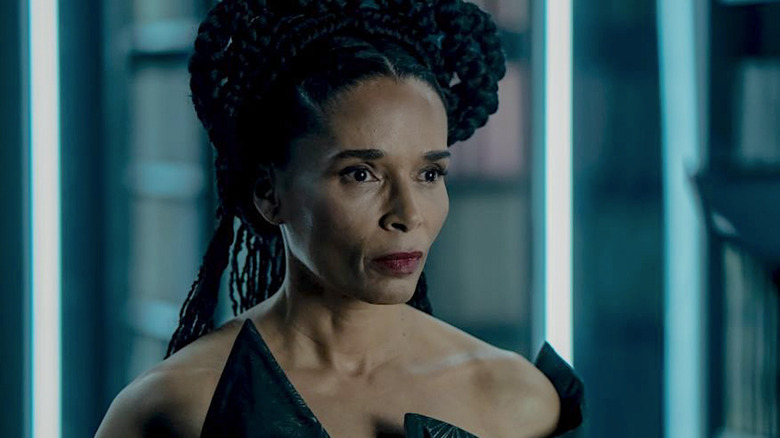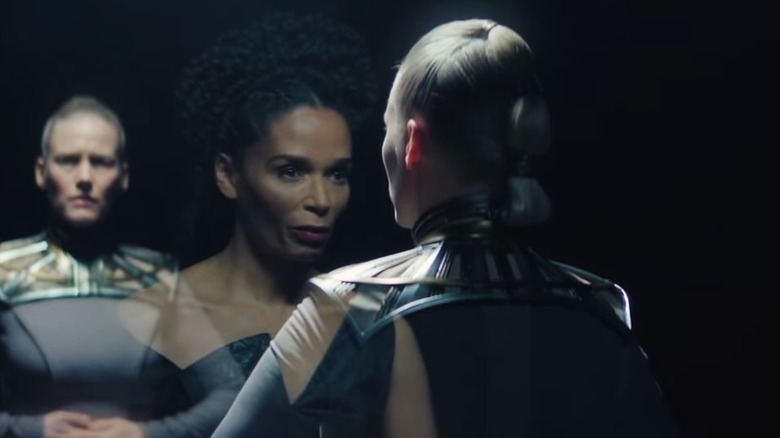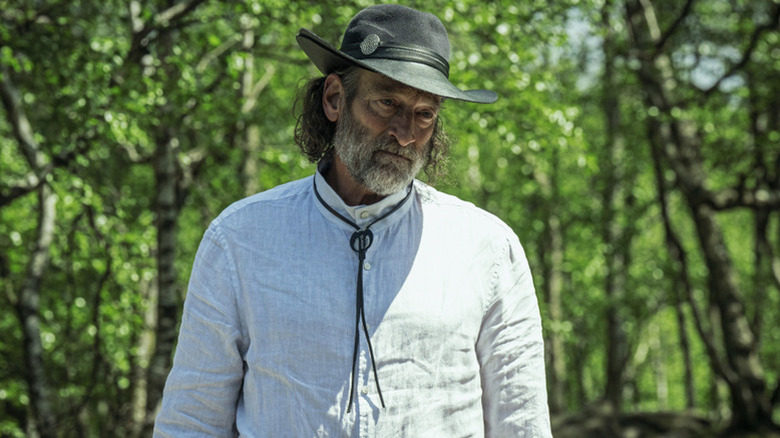The Sneaky Foundation Season 3 Line That May Be More Important Than You Realize
Apple TV's "Foundation" introduced and expanded on a lot of new elements in season 3. As the threat of the Mule (Pilou Asbæk) closed in, we learned a lot more about the mettle of the mentalic community called the Second Foundation. The show also explored the role and history of robots in this futuristic landscape — including Demerzel (Laura Birn), who ended up being a key protagonist in the plot of the collapsing empire.
In the midst of Demerzel's positronic season 3 revelations, the robot heads to the Imperial Library, which plays a critical role in Asimov's original story. In that visit, she meets the enigmatic Kalle (Rowena King), and together they talk about Demerzel's role in both Foundation and Empire. They also discuss the importance of robots having other robots to think with, and in the midst of that, one line caught my attention, when Kalle says: "Robots were not designed to stand alone. I'm amazed you still function. Laboring away, unjoined, like a single piston."
In context, this makes perfect sense. Demerzel is a lone robot in a universe that appears to have left positronic automatons behind. But the "laboring away, unjoined, like a single piston" part is what reminded me of something else, something much bigger, something that comes a little further into Asimov's Foundation series. I'm talking about Gaia, the living planet.
What is Gaia, the living planet?
Isaac Asimov wrote seven "Foundation" novels (including two prequels). The prequels and first three books focus on the Galactic Empire and the First and Second Foundations. Those are the areas we've covered on the show so far. But the last two books? They make a very abrupt pivot, leaving the Foundation versus Empire storyline behind and focusing on something else: the discovery, purpose, and future of the planet Gaia.
Gaia is an entire planet that contains a single, shared consciousness. Every human is connected and shares thoughts, memories, and mentalic capabilities. (i.e., they can influence and control the thoughts of others.) Even the flora and fauna are in on the planet-wide groupthink experiment. And the individuals who founded this planet? Robots.
Do you see where I'm going with this? When Kalle says Demerzel is "laboring away, unjoined, like a single piston," that is a calculated statement. It seems to be more than a "poor robot, all alone" comment. I think it's a direct reference to the incoming role of Gaia in the "Foundation" adaptation story. Will that role be different compared to the books? Absolutely. After all, Demerzel is the driving force behind creating Gaia in the printed version, and she clearly has no idea it exists yet in the show. But my point still stands. The reference to "single pistons" and the indication that many shared minds are clearly an advantage over a few seem to be sneaky references to the galaxy-changing shift toward Gaia moving forward.
This isn't the first time the show has hinted at Gaia
The suggestion that a single reference to an individual robot laboring away in isolation is talking about Gaia might feel like a stretch, but here's the thing. It isn't the first time the show has hinted at the living planet before. Back in late August, as season 3 was wrapping up, I pointed out another instance where the show seemed to be setting up the living planet concept.
This time, the reference came from a scene on Ignus in episode 8, where the Second Foundation is preparing to head off-planet to take on the Mule. As Gaal Dornick (Lou Llobell) talks to First Speaker Preem Palver (Troy Kotsur) about their plans, the latter points out that: "On Ignis we walk in each other's thoughts so much we're like one thing — One f***ing creature."
Maybe I'm seeing things, but I think these are references clearly hinting at the collective consciousness concept that is about to become a central feature of the storyline moving forward.
The question I have now is how they're going to handle the storyline heading into season 4. Gaia is a force for good in Asimov's writings, but it is also a tension point for debate around the collective versus individual freedom. Especially with shows like "Pluribus" shining a spotlight on the dangers of a shared consciousness, how will "Foundation's" new showrunners carry on the story as they look for ways to pivot from the Mule storyline to the endgame that is Gaia? It's likely the million-dollar question that will make or break the show moving forward.


